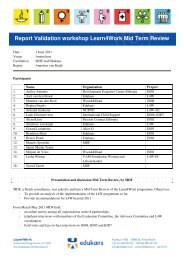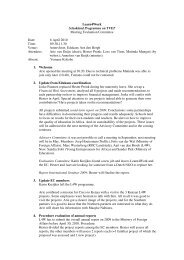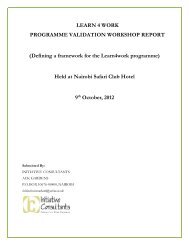DRAFT TECHNICAL AND VOCATIONAL EDUCATION AND ...
DRAFT TECHNICAL AND VOCATIONAL EDUCATION AND ...
DRAFT TECHNICAL AND VOCATIONAL EDUCATION AND ...
Create successful ePaper yourself
Turn your PDF publications into a flip-book with our unique Google optimized e-Paper software.
19<br />
3.5 Transition from School to Work. Existing approaches to improve transition<br />
The basic difference between TVET and general academic education is that TVET aims to<br />
prepare people for employment in specific occupational fields, hence the ultimate criterion for<br />
judging the efficacy of TVET is the extent to its graduates get and remain employed.<br />
Traditionally, Ghanaian TVET institutions have measured their success in terms of outputs<br />
such as number of trainees who have passed the end-of-programme examinations for the<br />
award of certificates and diplomas. Institutions have cared less about and not monitored<br />
what happens to their students after graduation. There is therefore, little information on<br />
student transition to the labour market.<br />
In the mid-1990s, the efficacy of vocational education came into question as unemployment<br />
among TVET graduates became visible and chronic. The dilemmas of transition from school<br />
to the world of work stimulated four kinds of awareness which the TVET system is struggling<br />
to institutionalize : (a) correcting the mismatch between curricula and industry needs; (b)<br />
need to monitor the transition to the labour market through tracer studies; (c) need for<br />
structured industrial attachment involving businesses, and (d) training towards selfemployment<br />
rather than towards paid employment only.<br />
The following extract from the Education Sector Performance Report 2008 (MoESS, 2008, p.<br />
136) summarizes the nature of the mismatch between training provided and industry<br />
expectations:<br />
Formal industry in Ghana appears to be generally of the view that TTIs can provide<br />
people with theoretical technical skills but not workplace skills. For example, the<br />
Human Resource Manager of a large textile company in Tema commented about TTI<br />
graduates:<br />
“They have heard about theory but know nothing about practicals. So when<br />
they come you have to train them and in almost everything …. And almost all<br />
industries have the same problem.”<br />
In fact, industry frustration with the public TVET system and the perceived low<br />
quality of graduates coming out of the system led a number of industries to back the<br />
Ghana Industrial Skills Development Centre, an institution separate from any<br />
government ministry and allied to the Association of Ghana Industries.<br />
A few establishments were interviewed during this mapping exercise about the performance<br />
of trainees and graduates from TVET institutions. Here are some excerpts from the<br />
interviews:<br />
Excerpt No.1<br />
In general, when trainees come to GCAA for training or attachment, it takes<br />
them a long time for them to adjust and appreciate what is on the ground.<br />
Because of the deficiencies in training in our schools GCAA prefers taking<br />
Senior High school graduates and rather than taking products from TVET<br />
institutions to train them in the specialised areas in Airport Operations, Fire<br />
and Aviation Security while on the job.<br />
Excerpt No. 2: Electricals<br />
Trainees lack competencies in (1) Wiring, (2) Tracing Fault, (3) Identifying<br />
and knowing the difference between high voltage and low voltage and (4)<br />
knowing how these two voltage systems are handled.







